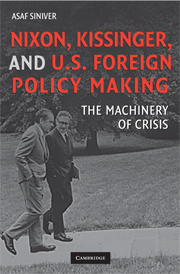Book contents
- Frontmatter
- Contents
- List of Figures
- Acknowledgments
- Abbreviations
- Dramatis Personae
- Nixon, Kissinger, and U.S. Foreign Policy Making
- Introduction
- 1 Structures, Processes, and Personalities in U.S. Foreign Policy
- 2 The Making of U.S. Foreign Policy During the Nixon-Kissinger Years
- 3 The Incursion into Cambodia, Spring 1970
- 4 The Jordanian Crisis, September 1970
- 5 The India-Pakistan War, December 1971
- 6 The Yom Kippur War, October 1973
- Conclusion
- Bibliography
- Index
- Plate section
- References
5 - The India-Pakistan War, December 1971
Published online by Cambridge University Press: 17 August 2009
- Frontmatter
- Contents
- List of Figures
- Acknowledgments
- Abbreviations
- Dramatis Personae
- Nixon, Kissinger, and U.S. Foreign Policy Making
- Introduction
- 1 Structures, Processes, and Personalities in U.S. Foreign Policy
- 2 The Making of U.S. Foreign Policy During the Nixon-Kissinger Years
- 3 The Incursion into Cambodia, Spring 1970
- 4 The Jordanian Crisis, September 1970
- 5 The India-Pakistan War, December 1971
- 6 The Yom Kippur War, October 1973
- Conclusion
- Bibliography
- Index
- Plate section
- References
Summary
What I'm concerned about, what I'm really worried about, is whether or not I was too easy on the goddamn woman when she was here … This woman suckered us. But let me tell you she's going to pay. She is going to pay.
Nixon to Kissinger, after his meeting with Indian Prime Minister Indira Gandhi, 6 December 1971Perhaps more than any other crisis examined in this book, the management of the 1971 India-Pakistan War epitomised the extent to which the decision-making process was constrained by Nixon and Kissinger's style of foreign policy making. Moreover, often during the crisis it seemed that Kissinger's own design of the advisory system acted as the ultimate constraint on Nixon's efforts to run U.S. foreign policy with as little bureaucratic meddling as possible. The impact of this pattern was manifested in three areas, which as has already been established, were the dominant features of the making of U.S. foreign policy during the Nixon-Kissinger years: first, the two men's disregard of the bureaucracy's advice, particularly that of the State Department; second, their predisposition to view what was in essence a regional crisis in terms of a realist, power-centred triangular politics, thus unnecessarily bringing China and the Soviet Union into the equation; and third, the issue of excessive secrecy, which was brought to the fore following the dramatic disclosure of WSAG minutes by a syndicated columnist.
- Type
- Chapter
- Information
- Nixon, Kissinger, and US Foreign Policy MakingThe Machinery of Crisis, pp. 148 - 184Publisher: Cambridge University PressPrint publication year: 2008



